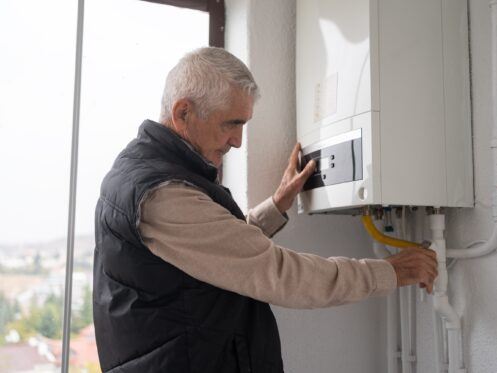The advantage of tankless water heaters is that they promises an endless, instant supply of hot water when it’s needed along with impressive energy savings. According to the U.S. Department of Energy (DOE), for a household that uses 41 gallons of hot water or less each day, the right tankless water heater can offer efficiency increases of up to 34%. If you’re thinking about installing tankless water heaters in your Brighton, CO home, you’re probably curious about how they work and why they’re so popular. Read on to find out more.
How a Conventional, Storage-Based Water Heater Works
Conventional storage-based or tank-based water heaters heat water in advance of the need for it. These appliances have limited storage capacity and thus, for larger homes with greater hot water demand, larger tanks are necessary. Although storage-based models have worked quite well for residential water heating for many decades, increased concerns about energy consumption, energy waste, and environmental impact have brought some of their many shortcomings to light.
In general, heating water up and then storing it until it’s needed is hardly efficient. Storage-based water heaters use energy to initially heat water, and then they continually use energy to reheat it. On days when hot water demand is limited, the same tank of water might be heated and reheated multiple times.
Many tank-based water heaters also constantly lose heat energy because of poor insulation. If these units aren’t insulated properly, they’ll require more energy to keep their stored contents at the appropriate temperature. As such, while tank-based water heaters have a relatively modest upfront cost, they can cost quite a bit to use over time.
Why Tankless Water Heaters Are Different
Just as their name implies, tankless water heaters don’t have storage tanks, and they don’t heat water and store it. Instead, they produce hot water right when it’s needed. In a small household with limited hot water demand, a single tankless water heater can meet everyone’s hot water requirements. In homes with multiple hot-water-reliant appliances and numerous residents wanting hot showers or baths, two or more tankless water heaters could be required.
The on-demand hot water supply that tankless water heaters offer solves two common problems. First, it prevents unnecessary energy waste by eliminating the need to reheat stored water. Second, it ensures that all building residents have instant access to ample hot water as needed. If you’re tired of standing under a lukewarm shower after everyone else has had their bath or having to wait for the dishwasher to complete its cycle before starting your grooming routine, a tankless water heater is a worthwhile investment.
Also known as point-of-use water heaters, some tankless water heaters can be installed at each hot water tap in the building. This setup ensures that in large households and during times of high hot water demand, tankless water heaters are never overwhelmed.
How Tankless Water Heaters Create Hot Water
Compared to tank-based water heaters, tankless models have slim and inconspicuous profiles. They don’t require massive amounts of storage space, and with point-of-use options, they’re often housed right behind appliances or underneath sinks. When hot water taps are turned-on, cold-water flows through their internal heat exchangers. This water is then heated by an electric element or a gas burner. With gas-fired appliances rapidly being phased out throughout many areas of the nation, electric, tankless water heater models are fast becoming the top choice.
Assessing the Benefits and Drawbacks of Tankless Water Heaters
If you’ve ever had a water heater tank rupture, then you’re well-familiar with the drawbacks of using storage-based water heater designs. Given that tankless water heaters never actually store water, there’s virtually no risk of having these units dump gallons upon gallons of water on your floor.
The higher cost of tankless water heaters is both a benefit and a drawback. Although you’ll pay quite a bit more upfront to have a tankless water heater installed, you’ll also save a fair amount of cash over time by lowering your energy bills. If you’re interested in reducing your carbon footprint as well, an electric tankless model can help with that too.
In an increasingly eco-conscious climate, switching to tankless water heating is a decision that can add value to your property. This is an excellent home improvement if you intend to sell soon. Many savvy home buyers are actively searching for properties that are either in-line with or ahead of progressively stringent efficiency requirements.
We’ve been proudly serving Brighton, Colorado, and the surrounding communities since 2016. We offer a variety of plumbing services including sump pumps, gas piping, water heater repair, kitchen plumbing, toilets, and more. We also provide an impressive selection of tankless water heaters. To schedule an appointment, contact TYCO Plumbing today.



